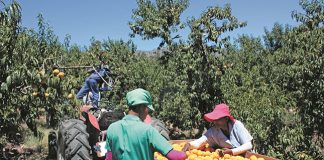Emotions ran high during a recent debate in parliament on the willing-seller, willing-buyer approach, with MPs presenting strong arguments on how land reform could be speeded up. The debate took place after the minister of Rural Development and Land Reform, Gugile Nkwinti, presented his budget speech, although the minister himself made scant reference to the willing-buyer, willing-seller principle.
Addressing the media ahead of his budget vote, Nkwinti said government needed to be involved in setting fair prices because the market alone would overprice the land. When land was sold by a farmer to the state, it was estate agents, land valuators and others that benefited from inflated land prices rather than farmers themselves, he said.
Nkwinti added that the state was a compelled buyer rather than a willing buyer, making it vulnerable to exploitation. During the debate, Athol Trollip, DA MP and a member of parliament’s Portfolio Committee for Rural Development and Land Reform, argued that the state was not a “compelled buyer”.
“Rather, the blame for your department’s glacial progress in finalising the restitution process and driving meaningful land reform lies fairly and squarely at you and your department’s door,” he said. Trollip accused the officials of the Department of Rural Development and Land Reform (DRDLR) of “ineptitude, carelessness, lack of batho pele (putting other people first), lack of professionalism, integrity and blatant dishonesty”.
He argued that it was not the constitutional provision of “willing buyer and willing seller” that constrained land reform success, but the fact that the department was “responsible for contriving to create artificial land value inflation that stifles your ability to acquire land”. Siding with the minister, the chairperson of the portfolio committee, ANC MP Stone Sizane, bemoaned the inefficiencies of the current land reform model, saying that government needed to “change direction on the land question if redistribution is to be speeded up”.
He strongly criticised current legislation that governed land reform, restitution and land ownership, arguing that the law “stipulates that land that was taken by force can only be available to those former owners through cash”. “However, the same law does not require those who own the land to make some form of concession of reparation to those whose dignity and means of well-being has been deprived,” he added.
Inkosi Cebekhulu, IFP MP and also a member of the portfolio committee, said that the pace of land reform was very slow and the “willing-buyer, willing-seller model has not proved to be the most efficient model”. But he added that land claimants were being let down by the “current state of chaos in the land claims office” and called on the minister to investigate allegations of maladministration that was causing huge delays in the claims process.
Green Paper
During the media briefing, Nkwinti said that the six working groups set up last year to study proposals on the Green Paper on Land Reform had been making progress. When proposals were formulated, these would be put forward to Cabinet for approval. He added that the proposals on communal land tenure would take the longest to reach consensus on, as they were the most difficult, while the working group looking at the proposal to set up a Land Valuer-General was moving along quickly.
Trollip criticised “the department’s intention to draft relevant legislation on a piecemeal basis as and when it is ready”. He said this would allow “conveniently selective implementation of the Green Paper at the ANC’s discretion”. But Agri SA deputy president Theo de Jager, who attended the debate, told Farmer’s Weekly that the agricultural sector supported the way in which the minister was driving interaction in the Green Paper process.
“We are part of the discussions. What more could we ask for?” asked De Jager. He said that Agri SA agreed with the minister that the various proposals should be put forward to Cabinet for approval once consensus was reached in the working groups.
Expenditure plan
The DRDLR was allocated about R8,9 billion for 2012/2013. According to the 2012 estimates of national expenditure, the implementation of the comprehensive rural development programme, land reform, and the settlement of restitution claims, would form the bulk of spending. Nkwinti indicated that approximately R2,7 billion would be spent on land reform to provide access to 320 000ha of agricultural land, while about R1,2 billion would be spent on the recapitalisation of 595 unproductive farms of land reform beneficiaries.










